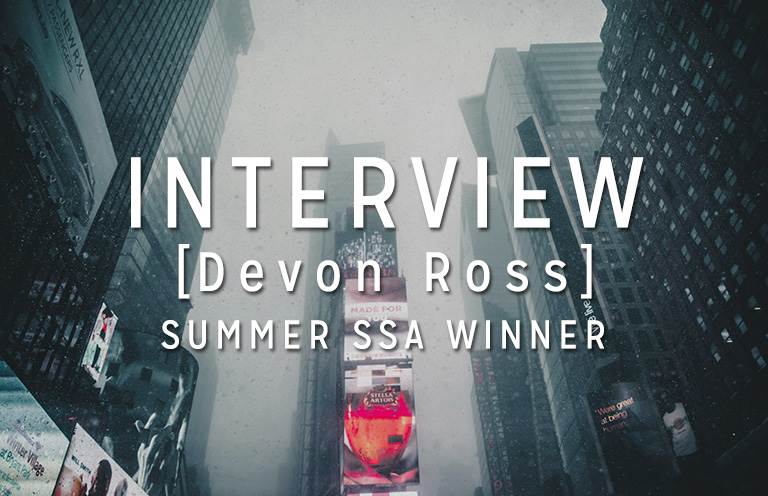Devon Ross won 1st place in our 2024 Summer Short Story Award for New Writers for her story, “Creeks.” After you’ve read her story, check out this interview below, where she talks about apathetic characters, quiet endings, big cities, and so much more.

First, congratulations on winning the Summer Short Story Award for New Writers. This is a really magnificent story, and the dynamics between all of the characters are nuanced and compelling. Maria in particular is an excellent foil for Allie—Maria, who is so perturbed by a stranger suggesting a bare hip in a magazine might be hers that she changes basically everything about her outward appearance. This line stands out to me, in particular, as Allie is probing her two lovers and weighing her options: “She would be like Maria but inverted, taking everybody in, being so unafraid.” What is the significance of Maria and Allie’s relationship, in your view?
Much of my writing is interested in apathetic characters who are—despite their best or worst efforts—unaffected by the things that loom large in the lives of the people they are closest to. In this story, Maria suffers what is, in her experience, a trauma, and Allie is
incapable of responding in a genuine way. With Allie, apathy or “emotional distance” is used as a kind of self-preservation as she navigates her multiple relationships. Maria does not have this skill, and although Allie is not a character who is going to come to any kind of conclusions about her own disaffections and how they have impacted her choices, it is certainly there for the reader to see. Maria and Allie’s differences become significant at the end of the story when we see a brief intersection in their shames and
fears as women.
I want to talk about the mood in this story—there’s something just a bit off about everything and everyone in a way that really heightens the tension and drama—there’s the man on the bus, of course, but also the oppressive aura of the butcher shop below Kellen’s studio, the rain that doesn’t seem to go away, a string of blank text messages, and so on. Was establishing this mood something you were conscious of as you were writing?
Yes, Allie’s relationships with these two men are just as “off” as the goings-on of the broader setting. Of course, there is not actually blood seeping out the doors of any butcher’s shop in New York, and I hope there are not any politicians having their college-age mistresses staple campaign flyer around campuses, but the characters at play here are exaggerated and messy, and I felt it was right to create a world (and a mood) that followed suit.
For the entire story, Allie can’t quite understand the reaction that Maria had to her encounter on the bus (she even distances herself from the language Maria used to describe it: “Or rather Maria called it an assault”), but then the same man–or a different man, perhaps–follows Allie from the park at the end of the story, and it’s such a brilliant way to conclude this piece, giving Allie the chance to see Maria a bit differently, while still leaving things open-ended in a way. I’m not sure there’s a question in here necessarily, but I wanted to call attention to how we leave things. Did you always envision this encounter as an end point for this story?
My only plan for the story was that I knew it would resolve quietly and without much fuss, as I feel that is true with many endings. I wanted to make the man in the park startling enough that the readers would draw parallels between Allie and Maria’s experiences. If Allie were wiser, and not twenty-one, she probably would’ve had some grand epiphany in the moments after her interaction with the man from the park, but instead it’s quieter and fleeting, slipping away before she’s able to grasp it.
How important was setting for you in this story? Do you think this is a piece that could be set anywhere other than New York City?
I especially enjoy writing stories that are set in big cities, and New York is one of those rare places where so many people from so many backgrounds can exist without the requirement of further explanation. It’s also a unique city because of how personal it is to
everyone who lives or visits there, meaning everyone has a different experience with it. New York can feel freeing to some people while trapping to others; it can be gross or beautiful, opportunistic or isolating. This kind of variety felt integral in a story that focuses on one woman’s encounters with so many different kinds of people.
What’s your writing process like? Are you someone who makes it a habit to write every day, or do you wait for inspiration to strike?
I wish I had a process that I could speak to, perhaps when I’m older and more set in my ways I will have a “creative process” to yap on about. For now, I have projects that I work on when I can. Sometimes they come together quickly, sometimes they don’t come
together at all. However, I do read every day, and to me that’s more important than the actual act of writing itself.
What are you working on now?
A few stories, a few essays, and a nearly-done novel women and relationships and the entertainment industry.
Interviewed by Cole Meyer
